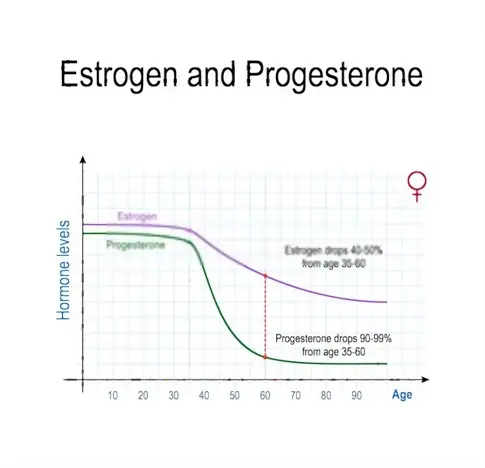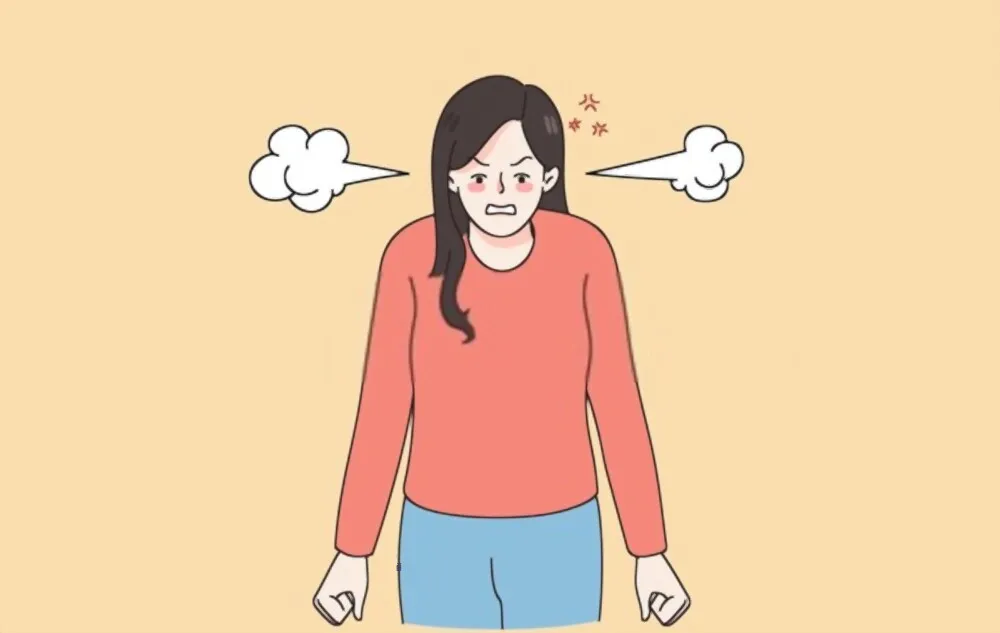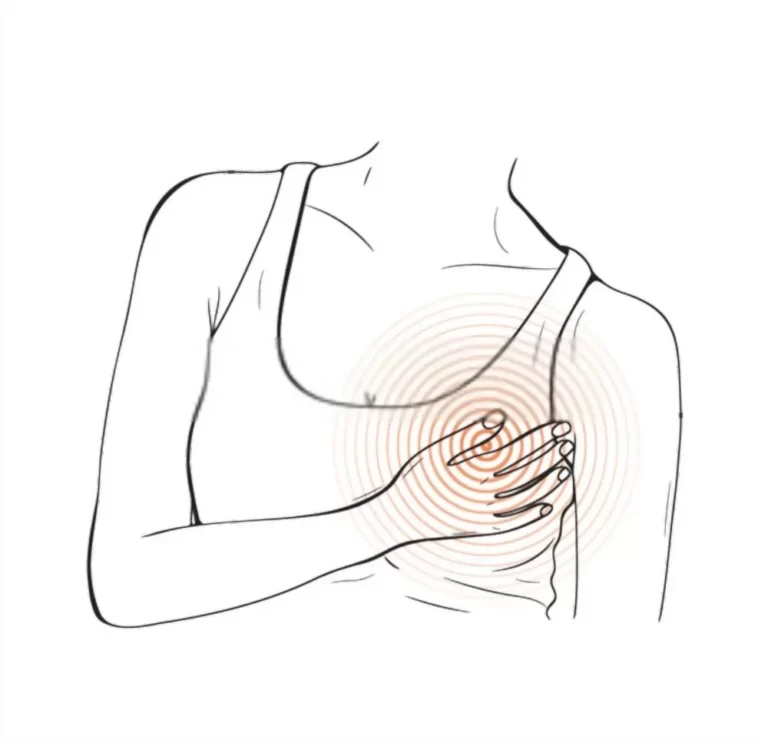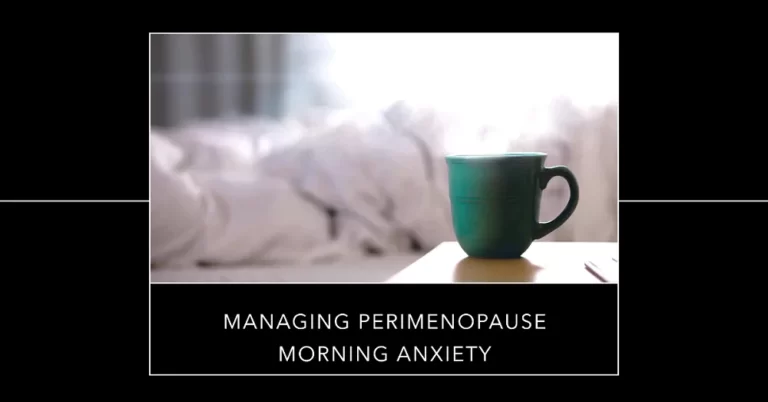Why does Menopause Cause Irritability: A Guide to Coping with Menopausal Blues
Menopausal irritability and depression can be a confusing and frustrating experiences for many women. One moment you may feel perfectly fine, and the next minute, you’re overcome with intense emotions that seem to have no logical explanation.
Any woman going through this phase often experiences ups and downs that can be unsettling for herself and those around her. But why does menopause make you irritable?
Menopause marks the end of the menstrual cycle, but it also means a decrease in estrogen levels messes with the brain chemistry and results in mood swings and irritability. As estrogen levels drop, the brain undergoes significant changes that can impact a woman’s behavior and mood.
The chemicals in the brain responsible for mood regulation, such as serotonin and dopamine, are affected by this hormonal imbalance, leading to irritability and mood swings. Also, brain structure changes can lead to memory, concentration, and mental clarity issues.
The symptoms are manageable, so don’t worry. Hormone replacement therapy can help restore estrogen levels, restoring a sense of equilibrium and calm.
Regular exercise, a healthy diet, and stress-reducing activities such as meditation and yoga can help alleviate menopausal symptoms. You’re not alone if you’re irritable during menopause, be kind to yourself, and don’t be afraid to reach out to friends, family, or your doctor.
Let us help you to explain further why menopause causes irritability and provide helpful tips to cope and manage your emotions during this transition.
The Science Behind Menopause and Irritability: How Hormonal Imbalances Impact Your Brain and Behavior?
All right then. Let’s dive into the fascinating world of menopause and how hormonal imbalances can impact your behavior.

First, a quick refresher on what menopause is: it’s a natural biological process that marks the end of a woman’s reproductive years. During menopause, your body undergoes significant hormonal changes, particularly with a decrease in estrogen levels, which can lead to many symptoms, including hot flashes, mood swings, and irritability.
But why does menopause sometimes make us feel so darn irritable? Well, it all comes down to our brain chemistry.
Estrogen plays a crucial role in regulating our mood, and when levels drop, it can affect the balance of neurotransmitters in the brain, such as serotonin and dopamine. These neurotransmitters regulate our sense of well-being and happiness, so when they’re out of whack, they can lead to mood swings and irritability.
But it’s not just our brain affected by hormonal imbalances during menopause. Our entire body is adjusting to a new normal, which can be overwhelming and stressful.
Sleep disturbances, hot flashes, and other physical symptoms can all affect our emotional well-being, making it even more difficult to manage mood swings and irritability. In addition, menopause can lead to changes in the brain’s structure.
MRI studies have shown menopause is associated with reduced gray matter in certain brain regions. Gray matter is the part of the brain responsible for processing information and making decisions.
Reduced gray matter can lead to memory problems, difficulty concentrating, and a general lack of mental clarity. All these changes can lead to mood swings and irritability, making it difficult for a woman to manage her emotions during menopause.
That sounds so depressing, right?!
Representations of the Menopausal Irritability and Depression
Menopausal irritability and depression can vary in intensity from mild to severe. Some women may only experience a slight dip in their mood, while others may feel extremely low for extended periods.
No matter the intensity, these symptoms can make life challenging for women already dealing with the physical changes that come with menopause. Some common signs of menopausal irritability and depression include feeling moody or low, difficulty sleeping, being tearful, or having difficulty concentrating.
Some may feel sad and hopeless and lose interest in previously enjoyable activities. Women can experience these symptoms differently depending on their circumstances, but some typical patterns can arise.

For example, women may experience sudden mood swings, outbursts of frustration, or anger, which seemingly minor things can trigger. They may also feel low, sad, or anxious for no apparent reason, leading to withdrawing from family and friends.
They might struggle to concentrate, challenging even the most straightforward tasks. It’s important to recognize that menopausal irritability and depression are real and can dramatically impact the quality of life.
Other Factors that Exacerbate Menopausal Mood Swings
In addition to hormonal changes during menopause, other factors can contribute to irritability and depression.
Stress
Stress is a natural part of life, but it can harm our physical and mental health when it becomes excessive. Chronic stress can exacerbate menopausal symptoms, including irritability and anxiety.
This is because stress triggers the release of certain hormones, such as cortisol and adrenaline, which can cause physical and emotional symptoms. When stressed, we also tend to engage in unhealthy coping mechanisms, such as overeating, drinking alcohol, or smoking, which can further impact our mental and physical health.
Stressful life events can make these feelings even worse. Think about it.
The death of a loved one or the loss of a job can be incredibly stressful for anyone, but during menopause, the emotional toll can be even greater. Hormonal changes can make it harder for women to deal with stress and can contribute to feelings of depression and irritability.
But it’s not just major life events that can have an impact. Everyday stressors, like work and family responsibilities, can also add up and make menopause symptoms worse.
Insomnia
Another factor that can exacerbate menopausal mood swings is sleep problems. There are many reasons why menopausal women may experience insomnia.
Hormonal changes are a common cause, as levels of estrogen and progesterone fluctuate during menopause. These hormones play a key role in regulating sleep, so disrupting them can lead to insomnia.
Other factors contributing to insomnia during menopause include hot flashes, night sweats, and anxiety. Hot flashes and night sweats can make it difficult to fall asleep, while anxiety can keep the mind racing and prevent relaxation.
Health Issues
Other health conditions can also contribute to menopausal mood swings, such as thyroid conditions or diabetes. Associated symptoms such as fatigue and weight gain can also impact a woman’s emotional well-being during this time.
While it’s normal, seeing your body change in ways you don’t expect can still be confusing and upsetting. Knowing what to expect and how to manage it can help make the transition a bit easier.
Fewer Social Connections
Menopausal irritability and depression can be challenging to deal with, especially when one’s social connections decline as they get older. Losing a partner or close friend can be emotionally draining, leading to isolation and loneliness.
These emotions can further augment irritability and may even pave the way for depression. Social isolation and loneliness can increase the risk of age-related diseases, cognitive decline, and mortality.
Menopausal women need to maintain their social connections with friends and family members, even if it’s only through phone or video calls.
Lack of Awareness
Menopause can be a difficult time for women, both physically and emotionally. Unfortunately, the topic is often cloaked in secrecy and shame, leading to misconceptions and a lack of understanding about what women go through during this period.
One of the most common side effects of menopause is irritability and depression, which can cause significant disruption in the lives of those affected. Recent studies have shown that menopausal irritability and depression affect up to 20% of women.
This significant number should not be ignored or swept under the rug. It’s important to understand that these symptoms are not a result of weakness or a lack of control but rather a natural response to hormonal changes during menopause.
The emotional toll can be devastating, leading to difficulty sleeping, relationship issues, and even problems at work. Sadly, many women feel ashamed to talk about their struggles, causing further isolation and despair.
Coping with Menopausal Irritability and Emotional Roller Coasters
Menopausal irritability can be hard to handle because you’re constantly on an emotional roller coaster.
So, what are your sympathy cards options? Well, there are several.
Keeping in Touch
If you or a loved one is going through menopause, keeping in touch and communicating effectively is important. Avoid bottling up your emotions and let your close ones know about the symptoms you’re experiencing.
This can help them understand what you’re going through and offer support. Be mindful of your thoughts and how they may be affecting your mood.
If you feel overwhelmed or anxious, talk to someone or write it down.
Practicing Mindfulness

Mindfulness is very effective for controlling menopausal irritability and reducing stress levels. If you can focus on being “at the moment” and observe your thoughts without judgment, you may be able to let go of negative emotions more easily.
Keep a sense of humor.
Laughing releases endorphins, hormones that boost your mood and relieve stress. Laughing increases oxygen intake.
Try watching a funny movie or spending time with friends who make you laugh. Find the humor in everyday life and lighten up.
Eat Healthy, Feel Healthy
The first step is to make sure your lifestyle supports emotional well-being. A healthy diet can help stabilize mood, improve energy, and reduce stress.
- Focus on whole, nutrient-rich foods: Whole grains, fruits, vegetables, lean protein, and healthy fats should be the foundation of your diet. These foods provide the nutrients and energy you need to keep your body and mind healthy.

- Eat enough protein: Protein is essential for maintaining muscle mass, supporting the immune system, and regulating hormones. Include protein-rich foods such as lean meats, fish, legumes, and tofu.
- Limit processed and sugary foods: Foods high in sugar and processed foods can lead to blood sugar spikes and crashes, worsening mood swings, and irritability. Instead, use natural sweeteners like honey, maple syrup, or stevia.
- Choose healthy fats: Healthy fats such as avocado, nuts, and olive oil can help boost mood and reduce inflammation. Avoid trans fats and saturated fats, which can increase the risk of heart disease.
- Stay hydrated: Drinking enough water is critical for physical and mental health. Dehydration can lead to fatigue, headaches, and irritability.
Aim for at least eight glasses of water per day.

- Avoid caffeine, alcohol, and nicotine: These substances can disrupt sleep and worsen mood swings. Try to limit or avoid them altogether.
Alternatively, have a cup of herbal tea for a calming and relaxing effect. You will definitely feel the difference.
- Develop a good habit of alternative health supplements: Natural health supplements such as herbs, vitamins, minerals, fatty acids, and phytonutrients can help balance hormones, reduce inflammation and improve mood. Try omega-3 fats from fish or flaxseed oil to support the body’s natural healing process.
Adaptogenic herbs like ashwagandha and Rhodiola rosea can help reduce stress levels. Magnesium can also be beneficial for menopausal irritability and anxiety.
Get Your Day Started with Fitness
Menopause can be challenging for many women, and coping with the symptoms can leave you feeling depleted and irritable. Regular exercise is one of the most effective ways to combat these symptoms.
Exercise has been proven to boost mood and relieve stress, thanks to the release of feel-good endorphins in the brain. It can also help to regulate hormones, which can become imbalanced during menopause, leading to mood swings and irritability.
To get the maximum benefits from exercise, try to get at least 30 minutes of moderate physical activity five days a week. This could be as simple as walking briskly around your neighborhood or trying a new yoga class.
If you’re struggling to find motivation, try joining a fitness class or teaming up with a workout buddy. Not only will this give you some extra support and accountability, but it can also be a fun way to socialize and make new friends.
Other beneficial exercises during menopause include cycling, swimming, and strength training. Strength training, in particular, can help prevent bone loss, which becomes more common as women age.
You should consult your healthcare provider before starting any new exercise regimen, especially if you have any underlying health conditions.
Alternative Stress Reduction Techniques
Some alternative therapies, including acupuncture, meditation, and yoga, may effectively manage the symptoms.
- Acupuncture is a traditional Chinese therapy that involves inserting thin needles into the skin at specific points to stimulate the body’s natural healing processes. It has been used for thousands of years to treat many conditions, including menopausal symptoms such as hot flashes, night sweats, and mood swings.
Studies have shown that acupuncture can effectively reduce the severity and frequency of these symptoms and improve overall quality of life.
- Another alternative therapy that can help manage menopausal symptoms is Meditation. This practice involves focusing the mind on a particular object, thought, or activity to cultivate a sense of calm and inner peace.
This can help reduce stress, improve mood, and increase well-being. It may also effectively reduce the severity of hot flashes and night sweats.
- Yoga is a form of exercise that combines physical postures with breathing techniques and meditation. It has been shown to have numerous health benefits, including reducing stress, improving flexibility and balance, and increasing overall strength and cardiovascular health.
Yoga can also reduce the severity and frequency of hot flashes, foggy thinking, and other menopausal symptoms.
- Additionally, mindful breathing exercises can help reduce stress and improve mental clarity. When we’re amid an emotional outburst, it can feel like the only thing to do is act on those feelings immediately.
However, that can lead to verbal or physical outbursts that we may later regret. Instead, try taking a deep breath and giving yourself space to calm down. This can give you the time and perspective to think through your emotions and respond more accurately.
It’s important to note that the mood swings of menopause are temporary and will pass with time. Giving yourself a moment to pause and reflect gives you the best chance to manage your emotions healthily.
Not only will this help you avoid lashing out at loved ones or co-workers, but it can also help you maintain your inner calm and balance.
Engage in a Creative Outlet
Engaging in activities that bring you joy and help to reduce stress can be beneficial during menopause. Creative outlets such as painting, photography, writing, or music can help to boost mood and provide a sense of fulfillment and satisfaction.
Spending time outdoors also has numerous health benefits. Nature walks or gardening can be a great way to relax and get fresh air.
Engaging in a creative outlet can help you manage menopausal irritability and mood swings in several ways. For one, it provides a healthy outlet for pent-up emotions and frustrations.
When engrossed in a project, it’s easier to forget your worries and anxieties and focus on the task. Moreover, creative hobbies can help increase your sense of self-esteem and accomplishment.
As you work on your project and see it take shape, you’ll feel a sense of pride and satisfaction that can be deeply gratifying. This can be especially important during the menopausal years when many women struggle with losing identity and purpose.
Sleep Hygiene
Menopause can mess with our sleep and leave us feeling fatigued and drained during the day. That’s why it’s crucial to establish healthy sleep habits. Here are some tips:
- Cut back on caffeine, nicotine, and alcohol in the evening. These substances can interfere with your ability to fall asleep and stay asleep.
- Make exercise a regular part of your routine, but try not to do it too close to bedtime. Working out helps tire your body and promotes more restful sleep, but exercising too close to bedtime can keep you up.
- If hot flashes and night sweats are waking you up, consider ways to sleep “cooler.” Opt for comfortable sleepwear made from a blend of cotton and polyester.
Sleeping with a window open and using light covers are other ways to stay cool and comfortable throughout the night. Remember, getting a good night’s rest is essential for managing irritability during menopause.
Natural Remedies
It’s possible to alleviate these symptoms without taking prescription drugs. Many women have found that certain herbal remedies, teas, and dietary changes can help manage hot flashes, night sweats, and other menopausal symptoms.
- One such remedy is ashwagandha. This herb has been used for thousands of years in traditional Ayurvedic medicine to treat various ailments, including stress and anxiety. Studies have shown that ashwagandha can help reduce symptoms of anxiety and depression and improve overall mood and well-being. It helps in soothing sleep disturbances and calming the nervous system.
- Another herb that is effective in reducing menopausal symptoms is black cohosh. This herb contains compounds similar to estrogen, which can help alleviate hot flashes, night sweats, and mood swings.
- Red clover is another natural remedy that may help alleviate menopausal symptoms. It contains isoflavones, similar to estrogen, and may help reduce hot flashes and night sweats. It has been shown to improve bone density, benefiting women during and after menopause.
- Soy is another natural remedy that may help reduce menopausal symptoms. Like red clover, soy contains isoflavones that can mimic the effects of estrogen in the body.
When taking any natural remedies, talking to your doctor or healthcare provider before starting is important. Some herbs and supplements may interact with other medications or have adverse side effects.
It’s important to use high-quality, reputable sources for your supplements to ensure their safety and efficacy.
Cognitive-Behavioral Therapy (CBT)
CBT is a type of therapy that helps individuals identify and change negative thought patterns and behaviors. By teaching individuals how to challenge their negative thoughts and replace them with more positive and rational thoughts, CBT can help reduce anxiety, depression, and other emotional symptoms associated with menopause.
One of the main benefits of CBT is that it helps women identify triggers for their emotional symptoms, such as stress or certain situations, and develop coping strategies for dealing with these triggers. This can include relaxation techniques, mindfulness exercises, or simply taking a break when feeling overwhelmed.
Seeking Support
Remember that you don’t have to go through this difficult time alone. Many support groups and organizations are dedicated to helping women navigate the menopausal transition.
Talking to a healthcare provider is an excellent first step in seeking support during menopause. They can provide accurate and reliable information about the available treatment options and discuss medication or counseling options with you.
Your healthcare provider can also diagnose hidden health conditions that may be causing or worsening your symptoms, such as hypothyroidism or depression.
Support groups, online forums, and peer counseling are some resources available to women going through menopause. These groups provide a safe space for women to share their experiences, learn from others, and receive emotional support.
Joining a menopause support group can provide women with a sense of community. It helps to know that you are not alone and that other women are going through similar experiences.
Support groups are also an excellent resource for information about medical treatments, alternative therapies, and lifestyle changes that may reduce the severity of menopausal symptoms.
Medical Management
In some cases, medical management can be necessary for women experiencing menopause. In severe cases where mood swings result in depression or anxiety, medical treatment can help control the symptoms.
Hormone replacement therapy (HRT) is one option. HRT can help ease the severity of some of the symptoms brought about by menopause.
Similarly, anti-depressants can be used to control the symptoms of depression or anxiety. Consult their healthcare providers on their available options based on their symptoms.
Addressing Stigma and Misconceptions
Menopause is a normal biological process that every woman goes through at some point in her life. However, despite being a natural part of aging, menopause is often surrounded by unnecessary stigma, myths, and misconceptions.
This can contribute to feelings of isolation, shame, and frustration for women experiencing menopausal irritability and emotional roller coasters. The common myth about menopause is that it only causes hot flashes and night sweats.
While these symptoms are certainly among the most prevalent, menopause can also trigger irritability, mood swings, anxiety, depression, memory problems, and even physical pain. These symptoms can make it difficult for women to concentrate, maintain healthy relationships, or perform well at work, leading to additional stress and anxiety.
Furthermore, menopause is often portrayed in the media as an embarrassing and shameful condition, which can prevent women from seeking help or talking openly about their experiences. This can exacerbate feelings of isolation and make it harder to find effective coping strategies or seek proper medical care.
To break down the stigma surrounding menopause, it is important to share accurate information and promote open communication about the subject. Seek resources such as books, websites, support groups, and medical professionals who can educate them about their specific symptoms and treatment options.
It is also important for friends, family members, and coworkers to understand what menopause is and how it can affect women, regardless of their age or background. By being supportive, non-judgmental, and empathetic, the people around women experiencing menopausal symptoms can help them navigate this complex phase of life with more ease and dignity.
Can Menopause Cause Extreme Irritability?
Absolutely! During this transition, hormonal changes can affect a woman’s emotions and cause intense irritability.
Menopause is often accompanied by varying levels of estrogen and progesterone, which play a vital role in regulating mood. Decreased these hormones can induce irritability, mood swings, and anxiety.
Besides hormonal changes, sleep deprivation and hot flashes that usually occur during menopause can also cause irritability. Women experiencing menopause may struggle to get a good night’s sleep, leading to fatigue, irritability, and difficulty regulating emotions.
Can Menopause Make You Forgetful and Have Trouble Concentrating?
Of course! Menopause can affect your memory and concentration.
Changes in hormones specifically decreased estrogen levels, can cause forgetfulness in some women. This can lead to difficulty remembering names, appointments, or even where you put your keys.
But don’t worry, this is a normal and common symptom that many women experience during menopause. It’s called “brain fog,” not just a figment of your imagination. It’s a real thing that can sometimes be frustrating and even worrisome.
Breaking the Stigma: Speaking Openly About Menopause and Emotional Instability
Menopause is a transitional stage that can be challenging and taxing on the mind and body. However, if necessary, irritability can be managed emotionally and physically through lifestyle changes, effective communication, and medical management.
Incorporating healthy lifestyle choices, like physical activity, a balanced diet, adequate sleep, and stress management techniques, can help control mood swings and emotional roller coasters. These irritability and mood swings are a natural part of menopause, and women should seek support from loved ones or medical professionals as necessary.
As we break down the stigma and talk openly about menopause and its effects, women can feel more empowered to take charge of their health and well-being.







